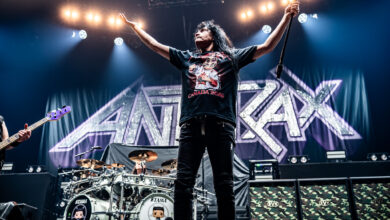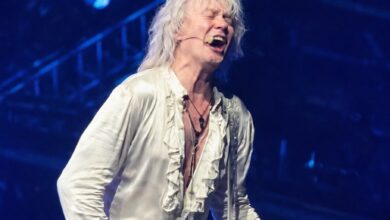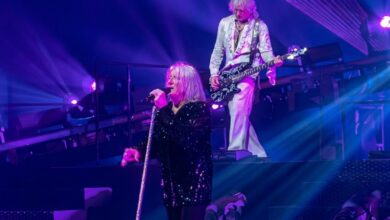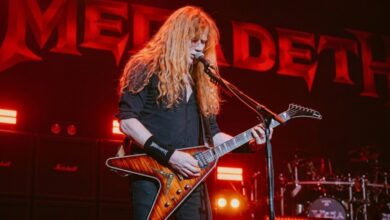At 65, Heart Performs “Alone” Live at Royal Albert Hall, Surpassing Contemporary Musicians
Heart’s debut at London’s Royal Albert Hall in June 2016 was more than just another stop on their tour. It was a once-in-a-lifetime performance that captured the band at a crossroads: celebrating a four-decade career while exploring new musical ground with the Royal Philharmonic Orchestra. Recorded on June 29 and released later that year, the concert film and live album documented one of the most unique shows in their history.
The decision to pair Heart with a full orchestra was deliberate. The Wilson sisters had always worn their love for Led Zeppelin, classical music, and layered arrangements on their sleeves, but this event gave them the rare chance to merge those influences with one of the most prestigious orchestras in the world. The Royal Albert Hall, with its legendary acoustics, provided the perfect canvas.
From the very beginning, the sense of occasion was palpable. As Ann Wilson, then 66, walked out, she carried the presence of a seasoned performer still capable of commanding a stage with sheer vocal force. Nancy Wilson, 62, balanced her sister’s soaring vocals with precision guitar work, demonstrating the synchronicity that had defined their partnership since the 1970s.
The setlist spanned eras, blending early career-defining tracks with 1980s hits and selections from their then-new album Beautiful Broken. Songs like “Magic Man” and “Dreamboat Annie” echoed the band’s early progressive leanings, while “These Dreams” and “Alone” reminded the audience of Heart’s dominance during the MTV-driven era. Each era was reimagined with orchestral textures, giving familiar songs fresh resonance.
“Silver Wheels” leading into “Crazy on You” was a highlight that bridged decades of live tradition. The guitar introduction showcased Nancy’s delicate fingerpicking before exploding into the full force of Ann’s vocals. With strings and brass swirling underneath, the song’s energy multiplied, creating one of the most dramatic renditions in Heart’s history.
Covers played an important role in the performance, most notably “No Quarter” by Led Zeppelin. For years, Heart had been known for their Zep tributes, but hearing this mystical piece accompanied by a symphony was transformative. It was both a dedication to the band that shaped their sound and a showcase of how Heart had carved out their own space in that lineage.
The quieter moments carried deep emotional weight. When the Wilsons performed “Sand,” originally from their Lovemongers project, the tone shifted dramatically. The song became a dedication piece—delicate, reflective, and mournful. Surrounded by an ocean of strings, it felt like a personal tribute to loved ones lost and to the passage of time itself.
Songs from Beautiful Broken such as “Heaven,” “Two,” and the title track revealed the band’s desire not just to relive the past but to continue evolving. These newer compositions fit seamlessly alongside the classics, proving that age had not dulled their creativity. Ann’s voice, though weathered, carried an emotional depth that no young singer could replicate.
Ann’s age and experience were especially evident in the ballads. At 66, her rendition of “Alone” was not just a display of vocal power—it was a testament to resilience. Each high note, supported by the orchestra, reflected not only technical mastery but a lifetime of lived emotion. Audiences felt the gravity of every lyric in a way that only decades of performance could bring.
Nancy, at 62, radiated vitality and poise. Her playing combined elegance with raw rock grit, and her harmonies with Ann added layers of intimacy. Together, their performance showed that growing older in rock music doesn’t mean fading away—it means deepening the expression. The concert became a celebration of age as strength, not limitation.
The orchestra itself added grandeur without overwhelming Heart’s rock foundation. Nick Davies conducted with sensitivity, ensuring that each arrangement elevated rather than buried the songs. Paul Buckmaster’s and Charles Floyd’s arrangements gave the performance a cinematic scale, making it as much a symphonic experience as a rock show.
The concert was released across multiple formats: Blu-ray, DVD, CD, and digital platforms. For many fans who couldn’t attend in person, these formats offered not just documentation but immersion, with crisp visuals and pristine sound that captured the hall’s unique atmosphere. It was marketed as Heart’s first-ever full concert with an orchestra—something truly historic.
Critics praised the release for both performance and production. Reviews highlighted the impeccable sound balance, noting how the orchestra’s lushness never drowned out the guitars or vocals. Fans were equally enthusiastic, describing the performance as both nostalgic and fresh, a rare balance for a band with such a long history.
This concert also served as a bridge between Heart’s past and future. While celebrating their legacy, the Wilson sisters used the opportunity to demonstrate that they were still very much artists in motion. Their age only amplified the authenticity, and their choice of repertoire reinforced the idea that true artistry evolves rather than freezes in time.
Today, the performance at Royal Albert Hall stands as a pinnacle moment in Heart’s career. It’s remembered not only for the sheer beauty of the music but also for what it symbolized: two sisters, now in their sixties, proving that rock and roll—and indeed life—gains depth with age. It was a dedication to their craft, their influences, their fans, and to the enduring power of music itself.





